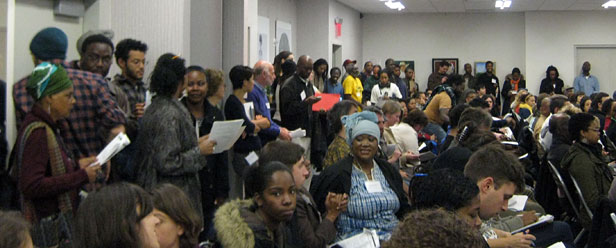 Photo: Dave MorrisAs the world gathers in Cancun for another round of maybe-we-might-want-to-start-doing-something talks on climate change, more and more cities are rolling up their sleeves and preparing to deal with the effects of that change on a practical, rather than a theoretical, basis.
Photo: Dave MorrisAs the world gathers in Cancun for another round of maybe-we-might-want-to-start-doing-something talks on climate change, more and more cities are rolling up their sleeves and preparing to deal with the effects of that change on a practical, rather than a theoretical, basis.
The New York Times reported last week on efforts in Norfolk, Va., to deal with rising sea levels — a problem exacerbated by the city’s location on filled-in marsh that has been sinking. Various factors have caused a 14.5-inch rise in sea level since 1930, and that means water in the city’s streets is becoming more and more common.
The Times article notes that Virginia’s attorney general, climate change denier Ken Cuccinelli, may be kicking up a fuss in the state capital — but that residents of Norfolk neighborhoods that flood on a regular basis don’t care much about that debate. On the contrary, they see themselves as a potential example for what many more communities might be dealing with in the future:
Many Norfolk residents hope their problems will serve as a warning.
“We are the front lines of climate change,” said Jim Schultz, a science and technology writer who lives on Richmond Crescent near Ms. Peck. “No one who has a house here is a skeptic.”
Politics aside, the city of Norfolk is tackling the sea-rise problem head on. In August, the Public Works Department briefed the City Council on the seriousness of the situation, and Mayor Paul D. Fraim has acknowledged that if the sea continues rising, the city might actually have to create “retreat” zones.
Kristen Lentz, the acting director of public works, prefers to think of these contingency plans as new zoning opportunities.
“If we plan land use in a way that understands certain areas are prone to flooding,” Ms. Lentz said, “we can put parks in those areas. It would make the areas adjacent to the coast available to more people. It could be a win-win for the environment and community at large and makes smart use of our coastline.”
Ms. Lentz believes that if Norfolk can manage the flooding well, it will have a first-mover advantage and be able to market its expertise to other communities as they face similar problems.
As Todd Woody reported last week, the nonprofit ICLEI-Local Governments for Sustainability is helping eight cities around the country to develop strategies to adapt to weather conditions and rising sea levels caused by climate change.
In an interview on the openalex blog, ICLEI USA’s Missy Stults said that the need to adapt to changing weather and sea levels might be instrumental in fostering widespread acceptance of the idea that we need to take action to mitigate climate change:
There is a hypothesis in the field that climate adaptation is the backdoor to climate mitigation — and I very much think this is true. At some point, we realize there are things that we can’t adapt to and maintain the basic services and quality of life we are use to. This information is often a motivator for action.
In a recent wide-ranging piece about the need for adaptation to a changing climate, The Economist pointed out a shift in attitudes in the adaptation vs. mitigation debate. They do so in typical Economist style:
The green pressure groups and politicians who have driven the debate on climate change have often been loath to see attention paid to adaptation, on the ground that the more people thought about it, the less motivated they would be to push ahead with emissions reduction. Talking about adaptation was for many years like farting at the dinner table, says an academic who has worked on adaptation over the past decade. Now that the world’s appetite for emissions reduction has been revealed to be chronically weak, putting people off dinner is less of a problem.
And as ICLEI’s Stults noted, maybe the distasteful realities of adaptation will actually increase the appetite for emissions reduction, rather than decrease it.



